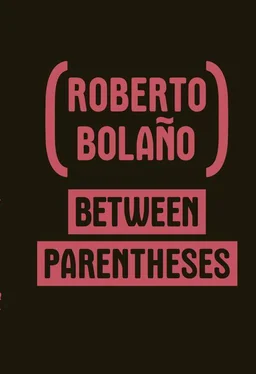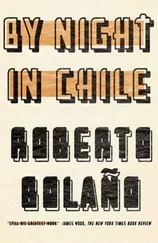Roberto Bolaño - Between Parentheses - Essays, Articles and Speeches, 1998-2003
Здесь есть возможность читать онлайн «Roberto Bolaño - Between Parentheses - Essays, Articles and Speeches, 1998-2003» весь текст электронной книги совершенно бесплатно (целиком полную версию без сокращений). В некоторых случаях можно слушать аудио, скачать через торрент в формате fb2 и присутствует краткое содержание. Год выпуска: 2011, Издательство: New Directions, Жанр: Публицистика, Критика, на английском языке. Описание произведения, (предисловие) а так же отзывы посетителей доступны на портале библиотеки ЛибКат.
- Название:Between Parentheses: Essays, Articles and Speeches, 1998-2003
- Автор:
- Издательство:New Directions
- Жанр:
- Год:2011
- ISBN:нет данных
- Рейтинг книги:4 / 5. Голосов: 1
-
Избранное:Добавить в избранное
- Отзывы:
-
Ваша оценка:
- 80
- 1
- 2
- 3
- 4
- 5
Between Parentheses: Essays, Articles and Speeches, 1998-2003: краткое содержание, описание и аннотация
Предлагаем к чтению аннотацию, описание, краткое содержание или предисловие (зависит от того, что написал сам автор книги «Between Parentheses: Essays, Articles and Speeches, 1998-2003»). Если вы не нашли необходимую информацию о книге — напишите в комментариях, мы постараемся отыскать её.
The Savage Detectives
Between Parenthese
Between Parentheses: Essays, Articles and Speeches, 1998-2003 — читать онлайн бесплатно полную книгу (весь текст) целиком
Ниже представлен текст книги, разбитый по страницам. Система сохранения места последней прочитанной страницы, позволяет с удобством читать онлайн бесплатно книгу «Between Parentheses: Essays, Articles and Speeches, 1998-2003», без необходимости каждый раз заново искать на чём Вы остановились. Поставьте закладку, и сможете в любой момент перейти на страницу, на которой закончили чтение.
Интервал:
Закладка:
BOLAÑO: Luckily he’s much more like his mother than like me.
PLAYBOY: Do you care about the sales rankings of your books?
BOLAÑO: Not in the slightest.
PLAYBOY: Do you ever think about your readers?
BOLAÑO: Almost never.
PLAYBOY: Of all the things readers have said about your books, what has moved you?
BOLAÑO: I’m moved by readers in general, by those who still dare to read Voltaire’s Philosophical Dictionary , which is one of the most entertaining and modern books I know. I’m moved by the fortitude of young people who read Cortázar and Parra, just as I once read them and as I try to read them still. I’m moved by young people who sleep with books under their heads. A book is the best pillow there is.
PLAYBOY: What things have made you angry?
BOLAÑO: At this point getting angry is a waste of time. And sadly, at my age time matters.
PLAYBOY: Have you ever been afraid of your fans?
BOLAÑO: I’ve been afraid of the fans of Leopoldo María Panero, who in my opinion, by the way, is one of the three best living poets in Spain. In Pamplona, during a series of readings organized by José Ferrero, Panero was the last on the program, and as the day of his reading approached, the city (or the neighborhood where our hotel was) filled up with freaks who seemed to have just escaped from a mental asylum, which incidentally is the best audience any poet can hope for. The problem is that some of them didn’t look only like madmen. They looked like killers, and Ferrero and I were afraid that at some point someone would get up and say: I shot Leopoldo María Panero, and then plug four bullets into Panero’s head — and then with one each for Ferrero and me for good measure.
PLAYBOY: Are you curious about the critical anthology your fellow Chilean Patricia Espinoza is putting together?
BOLAÑO: Not at all. I think Espinoza is an excellent critic, regardless of how I’ll come off in her book, which I imagine won’t be very well, but Espinoza’s work is essential in Chile. In fact, the need for a new criticism — for lack of a better term — is something that’s become urgent everywhere in Latin America.
PLAYBOY: And what about the Argentine Celina Manzoni’s book?
BOLAÑO: I know Celina personally and I’m very fond of her. I dedicated one of the stories from Putas asesinas to her.
PLAYBOY: What things bore you?
BOLAÑO: The empty discourse of the Left. I take for granted the empty discourse of the Right.
PLAYBOY: What things do you enjoy?
BOLAÑO: Watching my daughter Alexandra play. Having breakfast at a bar on the beach and eating a croissant as I read the paper. The works of Borges. The works of Bioy. The works of Bustos Domecq. Making love.
PLAYBOY: Do you write by hand?
BOLAÑO: Poetry, yes. Everything else on an old computer from 1993.
PLAYBOY: Close your eyes: Of all the landscapes of Latin America you’ve seen, which comes to mind first?
BOLAÑO: Lisa’s lips in 1974. My father’s truck broken down on a desert highway. The tuberculosis ward of a hospital in Cauquenes and my mother telling my sister and me to hold our breath. A trip to Popocatépetl with Lisa, Mara, and Vera and someone else I can’t remember, though I do remember Lisa’s lips, her incredible smile.
PLAYBOY: What’s paradise like?
BOLAÑO: Like Venice, I hope, somewhere full of Italians. Somewhere that’s used well and used up and that knows that nothing lasts, not even paradise, and in the end it doesn’t matter.
PLAYBOY: And hell?
BOLAÑO: Like Ciudad Juárez, which is our curse and our mirror, the unquiet mirror of our frustrations and of our vile interpretation of freedom and of our desires.
PLAYBOY: When did you learn that you were gravely ill?
BOLAÑO: In 1992.
PLAYBOY: What parts of your character were changed by your illness?
BOLAÑO: Nothing changed. I discovered that I wasn’t immortal, which — at the age of thirty-eight — it was about time I discovered.
PLAYBOY: What things would you like to do before you die?
BOLAÑO: Nothing in particular. Well, I’d rather not die, of course. But sooner or later the great lady makes her entrance. The problem is that sometimes she’s no lady, let alone great. Instead, as Nicanor Parra says in a poem, she’s a cheap whore, which is enough to make anyone’s teeth chatter.
PLAYBOY: Who would you most like to meet in the afterlife?
BOLAÑO: I don’t believe in the afterlife. If it exists, I’ll be surprised. First thing, I’d sign up for whatever class Pascal was teaching.
PLAYBOY: Did you ever think about killing yourself?
BOLAÑO: Of course. At some point I survived precisely because I knew I could kill myself if things got worse.
PLAYBOY: Did you ever think you were going crazy?
BOLAÑO: Yes, but I was always saved by my sense of humor. I told myself stories that cracked me up. Or I remembered situations that made me roll on the ground laughing.
PLAYBOY: Madness, death, love: Which of the three has there been most of in your life?
BOLAÑO: I hope with all my heart that it’s love.
PLAYBOY: What makes you laugh?
BOLAÑO: My own misfortunes, and other people’s misfortunes.
PLAYBOY: What makes you cry?
BOLAÑO: The same thing: misfortunes, mine and other people’s.
PLAYBOY: Do you like music?
BOLAÑO: Very much.
PLAYBOY: Would you cut anything from The Savage Detectives ?
BOLAÑO: No. To cut anything I would have to reread it and that’s against my religion.
PLAYBOY: Aren’t you afraid that someone might make a movie of it?
BOLAÑO: Ay, Mónica, I’m afraid of other things. More horrific things, shall we say; much more horrific things.
PLAYBOY: Is “Mauricio (‘The Eye’) Silva” an homage to Julio Cortázar?
BOLAÑO: Not at all.
PLAYBOY: When you finished writing “Mauricio (‘The Eye’) Silva” didn’t you feel that you had written a story on a par with “House Taken Over”?
BOLAÑO: When I finished writing “Mauricio (‘The Eye’) Silva” I stopped crying. Or something like that. I wish it was like a Cortázar story, though “House Taken Over” isn’t one of my favorites.
PLAYBOY: Do you get along well with your editor?
BOLAÑO: Fairly well. Herralde is an intelligent and often charming person. It might be better for me if he weren’t so charming. The truth is that I’ve known him for eight years now, and at least as far as I’m concerned the love just keeps growing, in the words of the bolero. Though it might be better for me if I weren’t so fond of him.
PLAYBOY: What do you have to say about those who think The Savage Detectives is the great contemporary Mexican novel?
BOLAÑO: They say it because they feel sorry for me, they see me looking depressed or as if I’m on my last legs and the best they can come up with is a white lie, which in fact is only appropriate in cases like this and isn’t even a venial sin.
PLAYBOY: Is it true that it was Juan Villoro who convinced you not to give your novel By Night in Chile the title Storms of Shit ?
BOLAÑO: Villoro and Herralde.
PLAYBOY: Whose advice do you listen to most when it comes to your work?
BOLAÑO: I don’t listen to anyone’s advice, not even my doctor’s. I give advice right and left, but I never take it.
PLAYBOY: What is Blanes like?
BOLAÑO: A pretty town. Or a small city of 30,000, quite pretty. It was founded two thousand years ago by the Romans, and then people came from all over. It’s not a luxury resort, it’s a place for the working class. People from Northern or Eastern Europe. Some end up staying forever. The bay is beautiful.
PLAYBOY: Do you miss anything about your life in Mexico?
Читать дальшеИнтервал:
Закладка:
Похожие книги на «Between Parentheses: Essays, Articles and Speeches, 1998-2003»
Представляем Вашему вниманию похожие книги на «Between Parentheses: Essays, Articles and Speeches, 1998-2003» списком для выбора. Мы отобрали схожую по названию и смыслу литературу в надежде предоставить читателям больше вариантов отыскать новые, интересные, ещё непрочитанные произведения.
Обсуждение, отзывы о книге «Between Parentheses: Essays, Articles and Speeches, 1998-2003» и просто собственные мнения читателей. Оставьте ваши комментарии, напишите, что Вы думаете о произведении, его смысле или главных героях. Укажите что конкретно понравилось, а что нет, и почему Вы так считаете.












